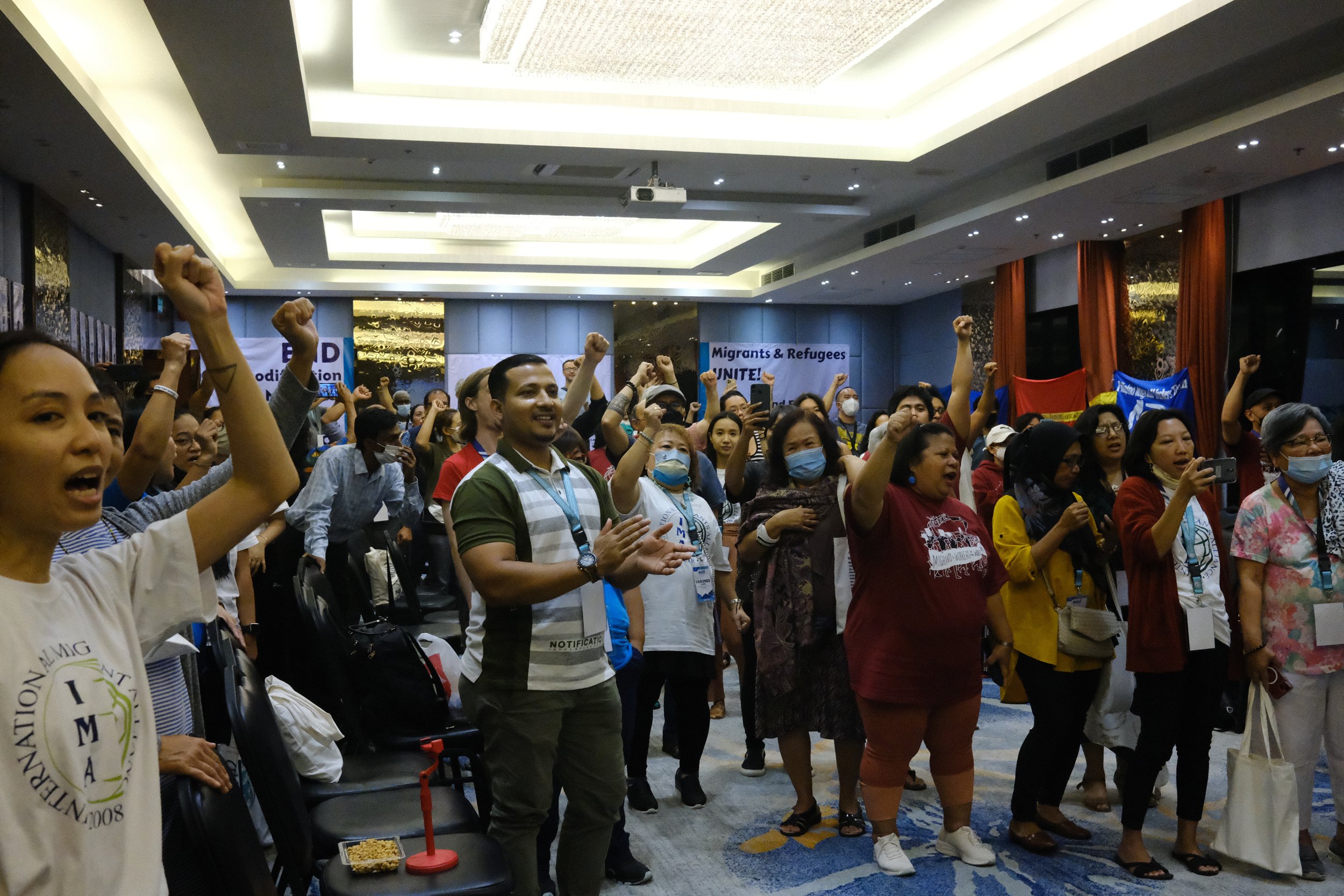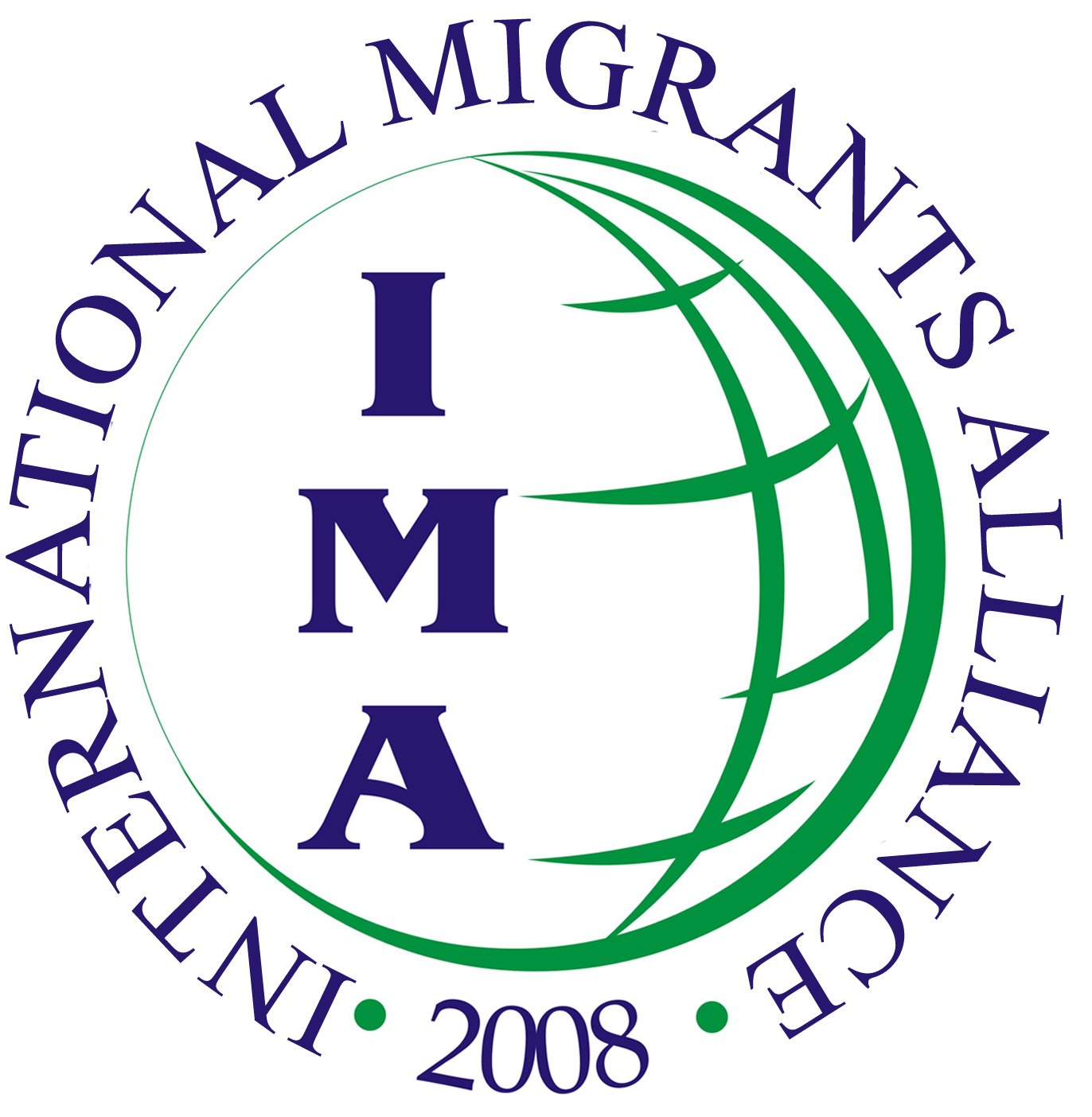Strengthen our ranks, expand our movement!
Unite with workers and the oppressed and exploited peoples to confront the crisis and fight imperialism!
Build a new system without forced migration and commodification of migrants!
Recap Video
Nov 30 - Dec 3, 2022









Highlights of the 5GA
The International Migrants Alliance (IMA) held its 5th Global Assembly from November 30 to December 3, 2022, in Bangkok, Thailand. The Global Assembly was a highly significant gathering for the migrant movement as it came at a critical time in world history. Strengthen our ranks, expand our movement! Unite with workers and the oppressed and exploited peoples to confront the crisis and fight imperialism! Build a new system without forced migration and commodification of migrants! This theme expresses the political and organisational thrust of the IMA for the next three years. It encapsulates our continuing campaigns on issues that arose or intensified during the pandemic (such as health, aid, jobs and justice) which are still continuing in many countries, while situating these in the multiple crises of the world capitalist system and the imperialist agenda on migration. Organisationally, our theme highlights IMA’s expansion offensive and our resolute efforts to consolidate our members.
Here are the highlights of the 5th Global Assembly with some supplemental materials:
DAY 1
WELCOME
The Global Assembly began with welcome remarks from Antonio Arizaga, Vice President of IMA Global, and Misun Woo, Regional Coordinator of Asia Pacific Forum on Women, Law and Development (APWLD). Antonio emphasized the historical and global context on which the 5th Global Assembly is based, emphasizing the impacts of the multiple crises of imperialism on migrant workers. Misun emphasized the hope and love that is vibrant in migrant movements and an ingredient in the struggle together. The Welcome Remarks were punctuated by the presentation of IMA’s Welcome Video and an Opening Ceremony by Catalina Lopez, of the Caravan of Mothers of Disappeared Migrants.
Link to Opening Video
Link to Welcome Remarks
KEYNOTE ADDRESS
Three Keynote Addresses explored the theme of the Global Assembly more deeply. Azra Sayeed, Chairperson of the International Women’s Alliance (IWA) and Vice Chairperson of the International League of People Struggles (ILPS), discussed the multiple crises of imperialism highlighting the phenomenon of concentration of wealth and finance capital leading to colonial conquest and imperialist expansion. Camilo Perez Bustillo of National Lawyers Guild-San Francisco discussed the decolonization of human rights and the role that migrant workers play. Finally, Robert Reid, President of First Union, talked about how migrant workers and trade unions can work together to resist exploitation.
Link to Keynote Addresses
PANEL ON ECONOMIC ISSUES
The first panel of the Global Assembly focused on the current economic conditions from the conditions in origin countries to destination countries as well as the latest trends impacting migrant workers such as precarious and informal employment and the role of service organisations and programs. Peter Chua of National Alliance for Filipino Concerns highlighted the deteriorating conditions of migrant workers due to increased exploitation in the workplace. Joanna Concepcion, chairperson of Migrante International, demonstrated that the rising prices of commodities, the pandemic response, decreased job growth, and poor agriculture has put origin countries in conditions of crisis as well. The particular conditions, as elaborated by Manuel Hidalgo of MIREDES International, has created a phenomenon of precarious and informal employment that have put migrant workers in a position where their jobs are not permanent and they are easily disposed. Johannie Tong of Mission for Migrant Workers Hong Kong punctuated the panel to talk about the conditions described have created a situation of neglect and the needs for services and engagement of migrant workers is a political issue that migrant workers organisations and service organisations help to fill.
Link to Panel Discussion 1 materials
PANEL ON POLITICAL AND SOCIAL ISSUES
The second panel then focused on the political and social issues of the time. The top issues include imperialist wars and aggression, racism and xenophobia, fascism and state repression, and climate change and displacement. Miki Shigeno of Philippines Australia Solidarity Association discussed how the rivalry between major imperialist powers, the United States, Russia, and China have impacted political and social conditions of the world. Jessica Rojas of Pacific Coast Coalition for Seafarers added further that the ruling class and imperialist powers uses tools such as racism and xenophobia to divide workers as well as justify their anti-people policies. Jenny Uchuari of Collective of Ecuadorian Immigrants in Brazil expanded on these topics by showing how border control and xenophobia are aspects of a broader mechanism of fascism and state repression. Finally, Emma Jackson, organizer of 350.org and board member of The Alberta Workers Association for Research and Education, added the condition of climate change which is being used an excuse to further border control, repression, and increase displacement of peoples.
Link to Panel Discussion 2 materials
FIRST TALKSHOW ON LESSONS FROM MIGRANTS’ CAMPAIGNS The first day of the Global Assembly concluded with the first part of a two-part talkshow series highlighting migrants’ campaigns. Glenis Balangue of IBON-Europe Office and Jang Cheon of Osan Migrants’ Center discussed anti-imperialist campaigns while Catalina Lopez of El Movimiento Migrante Mesoamericano (MMM) and Diana Ramirez of The Alberta Workers Association for Research and Education discussed migrants’ solidarity campaigns. Glenis highlighted campaigns opposing NATO-US aggression and Jang highlighted the need to oppose militarization and climate disaster. Catalina featured the migrant caravans and Diana talked about campaigns to oppose deportations and upholding the rights of migrants and refugees.
Link to Talkshow 1 materials
DAY 2
PANEL ON WOMEN AND MIGRATION
The second day of the Global Assembly began with a discussion on the condition of women migrants as well as strategies and challenges with organizing among women migrants. Ka Mei Lau of Asia Pacific Forum on Women, Law and Development discussed how most of the migration of women are involuntary and forced by nature, primarily driven by a patriarchal and neoliberal system that uses the exploitation of women to maximize profit and power. Dolores Ballarades, chairperson of United Filipinos in Hong Kong, focused on demystifying the increasing number of women migrants to show that it is not a signifier of empowerment for women but rather their exploitation and to call on women to come together and stand up for their rights as the genuine form of empowerment. Septi Yulianawati of Asian Migrants Coordinating Body (AMCB-IMA) and Natividad Obeso of Asociación Civil de Derechos Humanos Mujeres Unidas Migrantes y Refugiadas en Argentina (AMUMRA) discussed the challenges and experiences of organizing women migrant workers in their respective organizations.
Link to Panel Discussion 3 materials
PANEL ON EMERGING ISSUES AND CONCERNS PART 1
The last panel of the Global Assembly was a two-part series covering emerging issues and concerns for migrant workers and migrant organisations. The first part of the series tackled migrant workers among the youth and second and third generation migrant youth as well as the unionization of migrants. Adrian Bonifacio of BAYAN USA and Kenneth Crebillo of Kabataan Alliance emphasized the need to have a comprehensive youth organization with the correct analysis on forced migration and diaspora. Malick Sy of Confédération Nationale des Travailleurs du Senegal (CNTS) discussed that the phenomenon on forced migration is the effect of crisis in society and that workers organisations such as unions should do organize with migrant workers as part of their objective of progressing society.
Link to Panel Discussion 4 Part 1 materials
PANEL ON EMERGING ISSUES AND CONCERNS PART 2
The second part of the panel on emerging issues and concerns focused on other important groups: migrant agricultural workers, refugees and asylum seekers, and seafarers. Viviana Carol Medina of Immigrant Workers’ Center highlighted the particular conditions and organizing strategy of women migrant agricultural workers experiencing exploitation and gender-based violence. Fajar Santoadi of Tenaganita demonstrated the pressing issues and rights struggles of refugees in general and particularly in Malaysia, many of whom are urban refugees. Edwin Dela Cruz of International Seafarers Action Center (ISAC) presented how seafarers are involved in 90% of world trade but continue to face issues such as low wages, long work hours, accident prone ships, no security of tenure, little social protection, and hardships during the pandemic.
Link to Panel Discussion 4 Part 2 materials
SECOND TALKSHOW ON LESSONS FROM MIGRANTS’ CAMPAIGNS The second part of the Talkshow to share lessons from migrants’ campaigns focused on the participation of migrants overseas in homefront campaigns, which are campaigns related to issues in the country of origin, and campaigns showing cooperation among the working class and people’s organizations in the host country. Arman Hernando of Migrante Philippines and Sringatin of Jaringan Buruh Migran Indonesia (JBMI, Network of Indonesian Migrant Workers) discussed campaigns in the Philippines and Indonesia particularly concerning the rights and welfare of the people during COVID and to oppose deforestation and the burning of forests. Mrunal Shroff of Union Network of Migrants (UNEMIG) and Edith Adriana Saldano of Starbucks Workers United discussed how unionization and working with migrant workers were key strategies to ensure the rights and welfare of people in the workplace.
Link to Talkshow 2 materials
DAY 3
IMA HISTORY AND ORIENTATION
The third day of the Global Assembly was primarily focused on the organizational elements and aspects of the IMA. Before that, because of many new members and observers to the Global Assembly, the third day began with a presentation of the history and orientation to the Alliance.
Link to IMA History and Orientation
PRESENTATION OF THE VARIOUS GLOBAL REGIONS
The third day of the Global Assembly also included presentations of the various regions regarding the regional meetings and their main issues and concerns.
Link to the Presentation of the Regions




